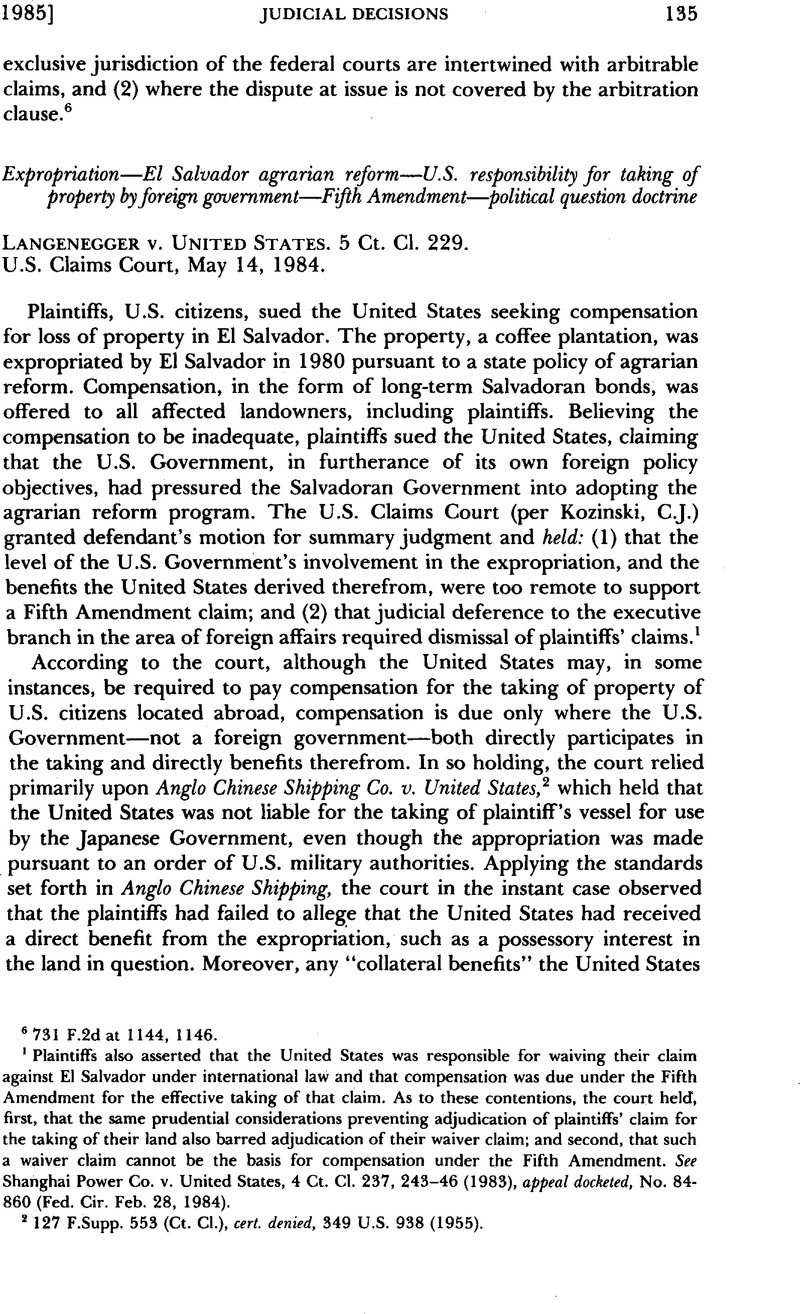Article contents
Langenegger v. United States
Published online by Cambridge University Press: 23 March 2017
Abstract

Keywords
- Type
- Judicial Decisions
- Information
- Copyright
- Copyright © American Society of International Law 1985
References
1 Plaintiffs also asserted that the United States was responsible for waiving their claim against El Salvador under international law and that compensation was due under the Fifth Amendment for the effective taking of that claim. As to these contentions, the court held, first, that the same prudential considerations preventing adjudication of plaintiffs’ claim for the taking of their land also barred adjudication of their waiver claim; and second, that such a waiver claim cannot be the basis for compensation under the Fifth Amendment. See Shanghai Power Co. v. United States, 4 Ct. Cl. 237, 243–46 (1983), appeal docketed, No. 84- 860 (Fed. Cir. Feb. 28, 1984).
2 127 F.Supp. 553 (Ct. Cl.), cert, denied, 349 U.S. 938 (1955).
3 5 Ct. Cl. 229, 232. The court distinguished precedent cited by plaintiffs for the proposition that the United States should be held liable as a “joint venturer” with the Salvadoran Government in the institution of the reform program. See, e.g., United States v. Hensel, 699 F.2d 18, 25 (1st Cir.), summarized in 77 AJIL 878 (1983), cert, denied, 103 S.Ct. 2431 (1983). The court noted that Hensel and similar decisions involved the exclusion from criminal prosecutions of evidence that is obtained illegally by foreign law-enforcement officials acting in concert with U.S. officials.
4 5 Ct. CI. at 233.
5 Cf. Baker v. Carr, 369 U.S. 186, 211–13 (1962) (application of political question doctrine).
6 5 Ct. CI. at 235.
7 104 S.Ct. 2321 (1984). See also Aris Gloves, Inc. v. United States, 420 F.2d 1386, 1391 (Ct. CI. 1970) (deprival of owner’s property interest, not accretion of that interest to the Government, gives rise to Fifth Amendment claim).
8 See, e.g., Hirota v. MacArthur, 338 U.S. 197 (1948) (postwar military tribunals held to have been established by U.S. military on behalf of Allied powers, and thus were not U.S. tribunals governed by the Constitution); Standard-Vacuum Oil Co. v. United States, 153 F.Supp. 465 (Ct. CI.), cert, denied, 355 U.S. 893 (1957) (United States not liable for use of American citizen’s property by forces occupying Japan, two judges concluding that the taking was by Allied powers, not the U.S. Government).
9 745 F.2d 1500 (D.C. Cir. 1984), vacating 724 F.2d 143 (D.C. Cir. 1983), summarized in 78 AJIL 446 (1984) (as De Arellano v. Weinberger).
10 745 F.2d at 1512.
- 1
- Cited by




